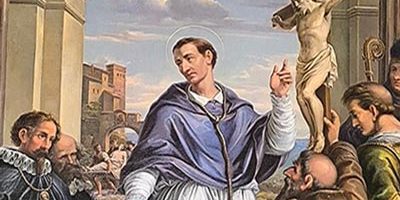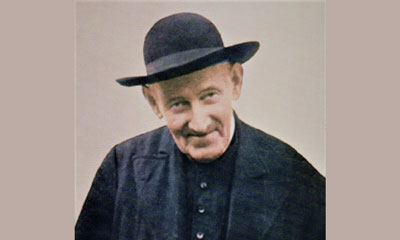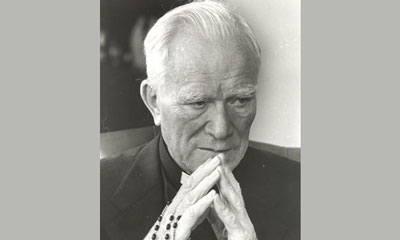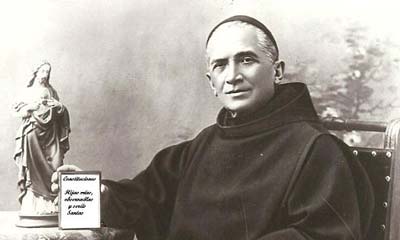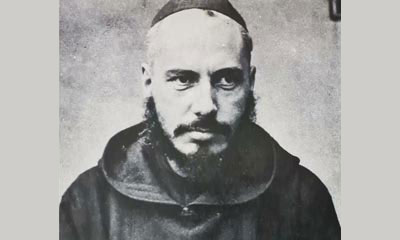September 21, 2020
Saint Charles Borromeo
Dear Friends,
“Saint Charles! Many a time have I knelt before his relics in the cathedral of Milan!,” Pope St. John Paul II reminisced on November 4, 1978, shortly after his election to the See of Peter. “Many a time have I wondered about his life, reflecting on the towering figure of this man of God and servant of the Church, Charles Borromeo, cardinal, bishop of Milan and man of the Catholic Council! He was one of the great figures of reform in the Church in the sixteenth century: the reform that was brought about by the Council of Trent, which will forever be associated with his name. He was also one of the creators of the institution of the ecclesiastical seminary, which would be reconfirmed in all its substance by the Second Vatican Council. He was, moreover, a servant of souls, one who never allowed himself to be mastered by fear; a servant of those who were suffering, ill, or sentenced to death. My Patron Saint!”
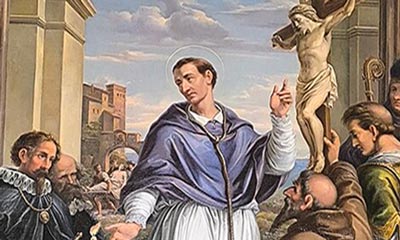 Charles Borromeo was born in the castle of Arona, in the north Italian province of Lombardy, on October 2, 1538. His father, Count Gilberto Borromeo, the governor of the Lake Maggiore region, was married to Margherita de Medici, the elder sister of the future Pope Pius IV. Charles was the second of six children. His mother died in 1547, when Charles was nine years old; his father remarried. The family’s fortunes prospered thanks to successful banking and business ventures. At the age of twelve, Charles, the youngest son, was appointed to the clerical state: he received the tonsure, and his father sent him to Milan to study Latin under an excellent master. In 1552, Charles continued his studies in Pavia under the direction of Francesco Alciato, who would later become a cardinal. His father gave him only a modest monthly allowance, and Charles sometimes found it difficult to make ends meet, to the point that his servants were not always properly clothed. Charles suffered greatly from this humiliating state of affairs, but there is no trace in his letters of impatience or reproach.
Charles Borromeo was born in the castle of Arona, in the north Italian province of Lombardy, on October 2, 1538. His father, Count Gilberto Borromeo, the governor of the Lake Maggiore region, was married to Margherita de Medici, the elder sister of the future Pope Pius IV. Charles was the second of six children. His mother died in 1547, when Charles was nine years old; his father remarried. The family’s fortunes prospered thanks to successful banking and business ventures. At the age of twelve, Charles, the youngest son, was appointed to the clerical state: he received the tonsure, and his father sent him to Milan to study Latin under an excellent master. In 1552, Charles continued his studies in Pavia under the direction of Francesco Alciato, who would later become a cardinal. His father gave him only a modest monthly allowance, and Charles sometimes found it difficult to make ends meet, to the point that his servants were not always properly clothed. Charles suffered greatly from this humiliating state of affairs, but there is no trace in his letters of impatience or reproach.
In 1558, Charles travelled to Milan in order to meet his uncle, cardinal de Medici. But within a few weeks, he was called back to Arona to assist at his father’s funeral. Charles was nineteen at the time and, although he was not the eldest son, his whole family asked him to take charge of the family business. Despite many interruptions, his diligence and conscientiousness allowed him to complete his studies in 1559 with a doctorate in utroque jure, i.e. in both canon and civil law. The summer of that same year saw the death of Pope Paul IV (Gian Pietro Carafa). The conclave that was then convened lasted four months and, in December 1559, Cardinal Gian Angelo de Medici, Charles’ uncle, was elected Pope. He chose the name of Pius IV.
Guided by the Good Shepherd
On January 3, 1560, Pope Pius IV ordered Charles to come to him in Rome at once. Within ten days of his election, the new Pope entrusted the government of the Papal States to his nephew. On January 31, he made him a cardinal. Charles asked that no public festivities be organized in Milan to celebrate his elevation to the cardinalate, but only that ten Masses be celebrated in Arona in honour of the Holy Spirit. He was then appointed to the archdiocese of Milan, first as its Apostolic administrator, and later as archbishop. Since he had not received any of the Holy Orders, he was obliged to entrust the administration of the diocese to a bishop of his choosing. “When he was still young,” St. John Paul II was later to recall, “Charles Borromeo was made a cardinal of the Holy Roman Church and archbishop of Milan; he was called to become Pastor of the Church because he, himself, accepted the guidance of the Good Shepherd. Thus he tended to his Church, partaking in the unfathomable mystery of Christ, the sole and eternal Shepherd of immortal souls, who encompasses centuries and generations, infusing in them the light of the ‘age to come’ (November 4, 1984). Later, cardinal Borromeo was also appointed Pontifical legate to various regions of Italy, as well as Protector of several countries and religious Orders at the Holy See. In his capacity as “cardinal-nephew,” he also fulfilled the office of Secretary of State of the Pope. Pius IV’s nepotism, or favouritism towards his nephew, was only too evident, but Providence would cause a considerable good to come out of this evil: Charles Borromeo, although he was only twenty-two, devoted himself to working strenuously in the service of the Church.
Steadfastness and patient diplomacy
Charles continued to manage the family business, without neglecting his studies. He also found time for wholesome recreation: he played the lute and the cello, as well as a ball game that was fashionable in Italy at the time. He founded a literary academy, several of whose works have been preserved under the title Noctes Vaticanæ (“Vatican Nights”). In 1561, he founded and endowed a college in Pavia: it was the first of its kind that fulfilled the Council of Trent’s recommendations regarding seminaries. The Council had been convened in 1537 by Pope Paul III, but would only open in Trent in 1545, and it was suspended more than once for political reasons. Pope Paul III aimed to bring about a general reform of the Church, in particular in the context of the Protestant Reformation, which was attacking the very foundations of the faith while denouncing various abuses in the life of the Church. Such was the disastrous situation in the Catholic world that it had become urgent to resume the Council, but there were many obstacles, in particular those created by several reigning sovereigns: Maximilian of Austria, Philip II of Spain and above all the king of France, Charles IX. One of cardinal Borromeo’s first major undertakings was to strive to remove these obstacles. His zeal for the good of Christendom, his steadfastness and his patient diplomacy eventually bore fruit, and Council sessions resumed on January 18, 1562. Charles Borromeo remained in Rome: his correspondence with the Pope’s legates at the Council was extensive: it almost amounted to steering the debates from afar. Despite great difficulties, arising partly from the irreconcilable demands of the various parties, the Council was able to conclude on December 4, 1563, eighteen years after its opening in Trent: it was now for to the Holy See to carry out the reform of the Breviary and the Missal, the drafting of a catechism for the use of pastors of souls, and the revision of the Latin text of the Bible.
On January 26, 1564, Pope Pius IV solemnly confirmed the decrees of the Council, to the great relief of all Christianity. The Supreme Pontiff then appointed a commission of three cardinals to ensure the implementation of the Council’s decrees, under the watchful eye of the cardinal-nephew. “That Pontiff himself, attributed the success of the Council to Charles, since even before carrying its decrees into action he was its most ardent promoter. In fact, his many vigils, trials, and labours brought its work to its ultimate completion,” Saint Pius X was later to declare in the encyclical Editæ sæpe of May 26, 1910. Pointing to Charles Borromeo’s inner life, the Pope added: “God’s wondrous works are matured in the obscurity and silence of a soul dedicated to obedience and contemplation. Just as the hope of the harvest lies in the sowing, so this preparation is the germ of future progress.”
Meanwhile, Charles’s elder brother had died, aged only twenty-seven. Now head of his family, Charles found himself in a paradoxical situation: while being the most influential member of the Pontifical Curia, he had not yet received holy orders; by renouncing the cardinalate, he might return to the world, marry and lead the life of a great lord. Several people urged him to do just that, for the good of his family and of the Duchy of Milan. The Pope himself, his uncle, was not averse to the prospect, provided that it should happen after his death, which he thought was quite near. But despite this advice, Charles firmly resolved to devote himself entirely to the Lord and to the Church. He prepared to take holy orders and intensified his prayer life. After being ordained a priest by cardinal Federico Cesi in the Basilica di Santa Maria Maggiore on July 17, 1563, he declared to the Holy Father, who was a little annoyed by the ceremony: “Do not be sorry, since I have chosen the bride I have wanted for a long time.” On December 7, he received the episcopal consecration in the Sistine Chapel.
Withdrawal from active affairs
By virtue of his office, it was Charles’ duty to remain by the Pope; he was, however, careful not to forget his Milan diocese, which he entrusted successively to several bishops to administer according to his instructions. In 1565, he went to Milan and convened a provincial council, which he directed in person (the province then had sixteen dioceses). It was at that time that he conceived the desire to retire completely from active affairs and to live in a monastery. The venerable Bartholomew of Braga (a Dominican who was the archbishop of Braga in Portugal), whom he considered to be a “friend of God,” managed to dissuade him and to convince him that he was indeed in the place where God wanted him to be. The following years were spent in Rome, mainly in preparing the reforms of the Missal and the Breviary, as well as in drafting the catechism requested by the Fathers of the Council. Charles was also a member of a commission charged with the revision of liturgical music.
Upon hearing that his uncle, the Pope, was ill, he rushed to his bedside; but the Holy Father’s condition was desperate. With the help of Saint Philip Neri, Charles endeavoured to prepare him for his death. Pius IV died on December 10, 1565. On January 7, 1566, the conclave elected cardinal Michele Ghislieri. Charles played a decisive role in the election, and it was at his suggestion that the new Pontiff took the name of Pius V. The new Pope expressed the wish to keep Charles near him, but after having taken steps to ensure continuity of the government of the Roman Curia, cardinal Borromeo finally obtained permission to live in his diocese, so he could govern it in person.
“Just as the office granted individually to Peter, the first among the apostles, is permanent and is to be transmitted to his successors, so also the apostles’ office of nurturing the Church is permanent, and is to be exercised without interruption by the sacred order of bishops… Episcopal consecration, together with the office of sanctifying, also confers the office of teaching and of governing, which, however, of its very nature, can be exercised only in hierarchical communion with the head and the members of the college” (Constitution Lumen gentium, Nos. 20 and 21).
“By the imposition of hands and through the words of the consecration,” as the Catechism of the Catholic Church teaches, “the grace of the Holy Spirit is given, and a sacred character is impressed in such wise that bishops, in an eminent and visible manner, take the place of Christ himself, teacher, shepherd, and priest, and act as his representative… For the bishop, this is first of all a grace of strength (“the governing spirit”): the grace to guide and defend his Church with strength and prudence as a father and pastor, with gratuitous love for all and a preferential love for the poor, the sick, and the needy. This grace impels him to proclaim the Gospel to all, to be the model for his flock, to go before it on the way of sanctification by identifying himself in the Eucharist with Christ the priest and victim, not fearing to give his life for his sheep” (Nos. 1558 and 1586).
The custody of Mary
Charles first made a pilgrimage to Loreto to place his episcopate under the custody of Mary, before entering Milan on April 5, 1566. He immediately set about reforming his vast diocese. He began with himself and his episcopal palace: he gave many of his personal belongings to the poor and sought to live in simplicity. Charles was well above average height, and quite corpulent. Even so, he inflicted on himself great mortification of the flesh, asking God’s forgiveness for his sins and for those of his flock. The fasting that he imposed on himself meant that he abstained from all food apart from a single meal taken, according to ancient ecclesiastical custom, at the end of the afternoon, after vespers; following the recommendations of Saint Augustine and Saint Ambrose, he saved for the poor what he had put aside from his table. He also tended to the prisoners.
Cardinal Borromeo was very careful when choosing the priests he appointed to the various offices of his diocese. His vicar general was a man of high learning, especially in law, and led an exemplary life. The administration of justice was entrusted to judges who were properly paid so as to forestall any temptation towards venality. He reformed the cathedral chapter and saw to the doctrinal training of his canons, so that they would diligently hear confessions. In 1577, he encouraged them to resume communal life and to recite in common the Divine Office in its entirety. Thanks to his tact and his goodness, his reforms were well received. Pope Saint Pius V commended him especially for this. As for the diocesan seminary, cardinal Borromeo made it a model of compliance with the decrees issued by the Council of Trent.
He also showed particular attention to the Christian Doctrine brotherhoods, so that children would be properly catechized. His example was to resonate in many other dioceses. On five occasions he visited the entire diocese, sometimes going on foot to virtually inaccessible mountain localities. In October 1567, he undertook to visit three valleys in the Valtellina, which came under his jurisdiction but were very isolated. Everything there was in need of reform. The clergy led a worldly, even scandalous life, neglecting their pastoral duties. The people’s moral behaviour followed that bad example. The episcopal visit produced very good fruits, and a new spirit breathed fresh life into both the clergy and the faithful. In another part of his diocese, cardinal Borromeo came under armed attack from the servants of a chapter of canons who claimed to be exempt from his jurisdiction and therefore from his pastoral visit: bullets struck the cross that by his orders, was carried before him, but he himself remained unharmed.
A pistol shot
Charles Borromeo encouraged the founding of several brotherhoods to give help to the poor and to sinners. He himself founded the Oblates of Saint Ambrose, an association of secular priests, to assist him in his ministry. The idea has been taken up again today under the name of “the Priestly Fraternity of the Missionaries of Saint Charles,” established in 1995 by Fr. Massimo Camisasca. Throughout his episcopate, the cardinal held several synods, both diocesan and provincial. These assemblies lasted about three days. Charles opened and closed each working day with a speech. He took advantage of these days to increase contacts with his priests and fellow bishops. From 1567 onwards, at the Pope’s request, he worked to restore regular discipline within the Order of the Humiliati. Some brothers accepted the measures he took, but others resisted, and went so far as to plan an attempt on his life. In October 1569, while archbishop Borromeo was conducting an office, a brother fired a pistol at him. Charles thought he had been seriously wounded, but he motioned to say that the office should continue. At its conclusion, it emerged that the bullet had been miraculously stopped on contact with his skin. Despite his pleas to the governor of Milan, four of the conspirators were caught, tried and executed. In 1571, Pope Saint Pius V suppressed the Order of the Humiliati.
The harvest of 1570 was a disaster; during the following winter, the country was struck by famine. Charles did all he could to feed the poor, so much so that, on some days, he provided for the needs of three thousand. His example was followed by other rich and powerful personalities, including the governor of Milan, the Duke of Albuquerque. That same year, Charles took advantage of the “prayer crusade” launched by Pope Saint Pius V in the face of the Turkish peril to encourage his people to convert and repent; he also exhorted his priests, and even himself: “It is the hour now for you to awake from sleep!” (Rom. 13:11). We too, the priests of Jesus Christ, who are required to watch over others, must hear the Apostle’s exhortation. We are the sentries whom God has posted to protect his people: woe to us if we indulge in sleep! The Lord has warned us: “If, however, the sentinel sees the sword coming and does not blow the trumpet, so that the sword attacks and takes someone’s life, his life will be taken for his own sin, but I will hold the sentinel responsible for his blood” (Ezek. 33:6). The Christian victory over the Ottoman invasion fleet at Lepanto, attributed to the intercession of the Blessed Virgin, was celebrated in Milan with thanksgiving and great rejoicing.
Although afflicted since the summer of 1571 with a continuous fever and cough, cardinal Borromeo went to Rome the following year for the conclave that followed the death of Saint Pius V. The new Pope took the name of Gregory XIII. Charles seized the opportunity to be relieved of the functions he still held within the Roman Curia. Soon after, the governor of Milan published forged letters in a bid to prove that the archbishop had infringed the royal prerogatives (Lombardy was at the time subject to the king of Spain). Having exhausted other remedies, Charles was forced to pronounce an explicit sentence of excommunication against the chancellor, a measure that also struck the governor. The conflict ran on for several months; the governor, who had taken steps against the Church of Milan and the Borromeo family, was ultimately obliged to retract and ask for absolution from the sentence of excommunication. Charles willingly granted his request.
The archbishop of Milan went to Rome for the jubilee of 1575. The following year, the jubilee was celebrated in the diocese of Milan, and Charles officiated at the fourth provincial synod there. At this time, however, the plague broke out. The archbishop toiled without rest, even unto visiting the plague-stricken in their homes or in hospitals. From the start of the epidemic, he had accepted the possibility of his own death in the service of the sick, in order to have greater spiritual freedom in the pursuit of his work. His clergy courageously followed the example he set, albeit at first with an understandable reluctance, which was soon overcome. The epidemic gradually abated in the years 1577 and 1578.
“Behold, I come”
In the autumn of 1584, an attack of erysipelas on one of his legs forced the archbishop to keep to his bed. Even so, he convened an assembly of the deans of the region to deal with the affairs of the diocese, while at the same time helping to found a convalescent hospital for needy patients. A presentiment of his imminent death prompted him, on October 15, to go into a personal retreat at the sanctuary of Varallo where he confessed all the sins of his life. Despite now having a high fever, Charles continued to celebrate Mass every day. When he returned to Milan, the doctors judged his condition to be very serious. He received Extreme Unction and then Holy Communion as viaticum. The crowd of faithful gathered in prayer around the archbishop’s palace was so packed that the Duke of Terra Nova, then the governor of Milan, had to force his way through to enter the building. On November 3, 1584, the cardinal, aged only forty-six, died after saying: “Ecce venio!—Behold, I am coming soon!” (cf. Rev. 3:11). Cardinal Niccolò Sfondrati, the future Gregory XIV, celebrated his funeral on November 7. Cardinal Borromeo’s reputation for holiness spread immediately, and continued to grow ever more widely. Pope Paul V canonized him on November 1st, 1610.
“My Brothers,” Saint Charles said in 1584 in a sermon on the wedding feast at Cana, “may Mary be our patroness, our advocate, our mother! If she takes up our cause, there is nothing to fear, for her help is assured. ‘O Mother most benign, look down upon us from heaven and see our hardship! Behold, we lack the wine of charity… Mary, implore for us that water be turned into wine!’ Yet the Virgin also asks us to cooperate with her prayers by promptly accomplishing all that her divine Son prescribes, so that we may ourselves experience the effects of His power.”


